 We would like to welcome you to the 2025 Georgia Peanut Tour. Whether this is your first time with us, or you are a “Peanut Tour Veteran,” we are very happy to host you on our 37th tour. As in previous years, you will be immersed in the production efforts of one of Georgia’s most important agricultural crops, and we hope this gives you better insight not only into the challenges our farmers face, but also reasons why we say that the world’s best peanuts are produced in Georgia. It is our hope that you will come to better understand and appreciate the heritage of peanut production in our state. Those engaged in the peanut industry, including farmers, buyers, processors, researchers, Extension personnel, and Georgia Peanut Commission representatives, are proud that Georgia is the leading peanut-producing state in the United States, and we are excited to share this year’s crop with you.
We would like to welcome you to the 2025 Georgia Peanut Tour. Whether this is your first time with us, or you are a “Peanut Tour Veteran,” we are very happy to host you on our 37th tour. As in previous years, you will be immersed in the production efforts of one of Georgia’s most important agricultural crops, and we hope this gives you better insight not only into the challenges our farmers face, but also reasons why we say that the world’s best peanuts are produced in Georgia. It is our hope that you will come to better understand and appreciate the heritage of peanut production in our state. Those engaged in the peanut industry, including farmers, buyers, processors, researchers, Extension personnel, and Georgia Peanut Commission representatives, are proud that Georgia is the leading peanut-producing state in the United States, and we are excited to share this year’s crop with you.
The 2025 Georgia Peanut Tour is staged in the south-central region of our state’s production area and begins on the afternoon of Tuesday, September 16, with a “Hot Topics” symposium. Expert speakers will address the status of our peanut crop and provide a special focus on enhancing the resilience of the peanut industry.
The next two days of the tour provide you an opportunity to learn more about production, research, processing and more. Field visits will provide you with a glimpse of peanut production, digging, and harvest. In addition, you will learn about the importance of on-farm research collaborations between the University of Georgia, Fort Valley State University, and commercial peanut farmers. The tour also includes visits down the supply chain to Tifton Quality Peanut’s shelling plant and Douglas Peanut’s buying point. Attendees will also tour Columbo, MANA, BCT Gin, and more!
Again, on behalf of the Peanut Tour Committee, with members from the USDA-ARS Peanut Lab, the Georgia Peanut Commission, and the University of Georgia, I warmly welcome you to the 37th Georgia Peanut Tour! We hope that over the next few days you will better appreciate the complexity of the peanut industry in Georgia and the personal commitments from all involved in producing the world’s finest peanuts! We hope our events will allow for fellowship and that you enjoy Georgia’s hospitality exploring a beautiful, rural part of our state. We offer our sincere thanks to all the sponsors, who through their generosity, help make this tour possible. Please do not hesitate to let us know how we can help you as we travel the highways and byways of our state’s production area. We are proud of our peanut farmers and our peanut industry, and we are happy that we can share them with you.

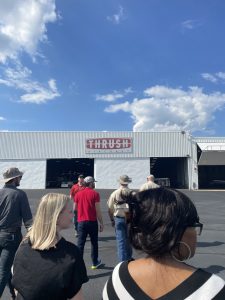

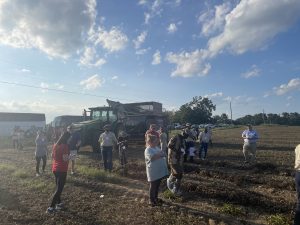
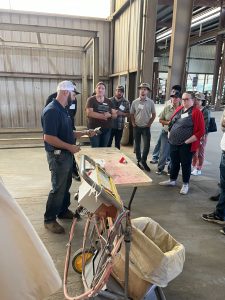
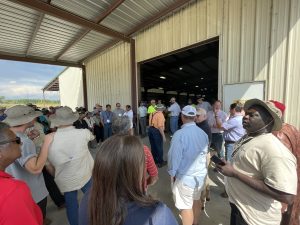
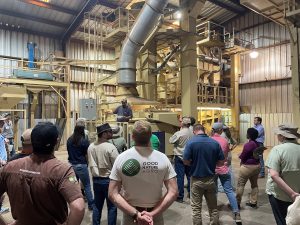 Georgia Seed Development is responsible for overseeing the foundation plant material production in Georgia. As a nonprofit, self-supporting organization, GSD provides economic support for new business opportunities that help keep agriculture as Georgia’s No. 1 industry. This effort has resulted in more than $15 million of additional support for University of Georgia cultivar development since 1997.
Georgia Seed Development is responsible for overseeing the foundation plant material production in Georgia. As a nonprofit, self-supporting organization, GSD provides economic support for new business opportunities that help keep agriculture as Georgia’s No. 1 industry. This effort has resulted in more than $15 million of additional support for University of Georgia cultivar development since 1997.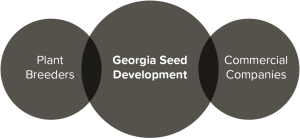
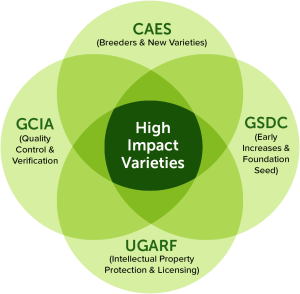
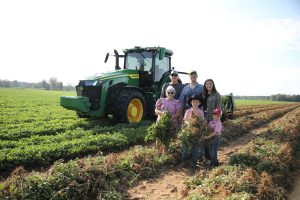
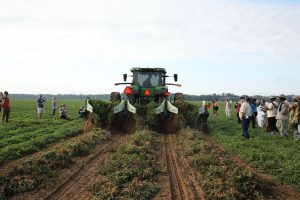 The field was planted behind a cover crop of black oats and radish. Riley strip tilled the peanuts in at planting. Throughout the season, Riley has an issues with drought in the dry corners of the field where the irrigation does not apply water to the crop. He has also had issues with spider mites which thrive in dry conditions.
The field was planted behind a cover crop of black oats and radish. Riley strip tilled the peanuts in at planting. Throughout the season, Riley has an issues with drought in the dry corners of the field where the irrigation does not apply water to the crop. He has also had issues with spider mites which thrive in dry conditions.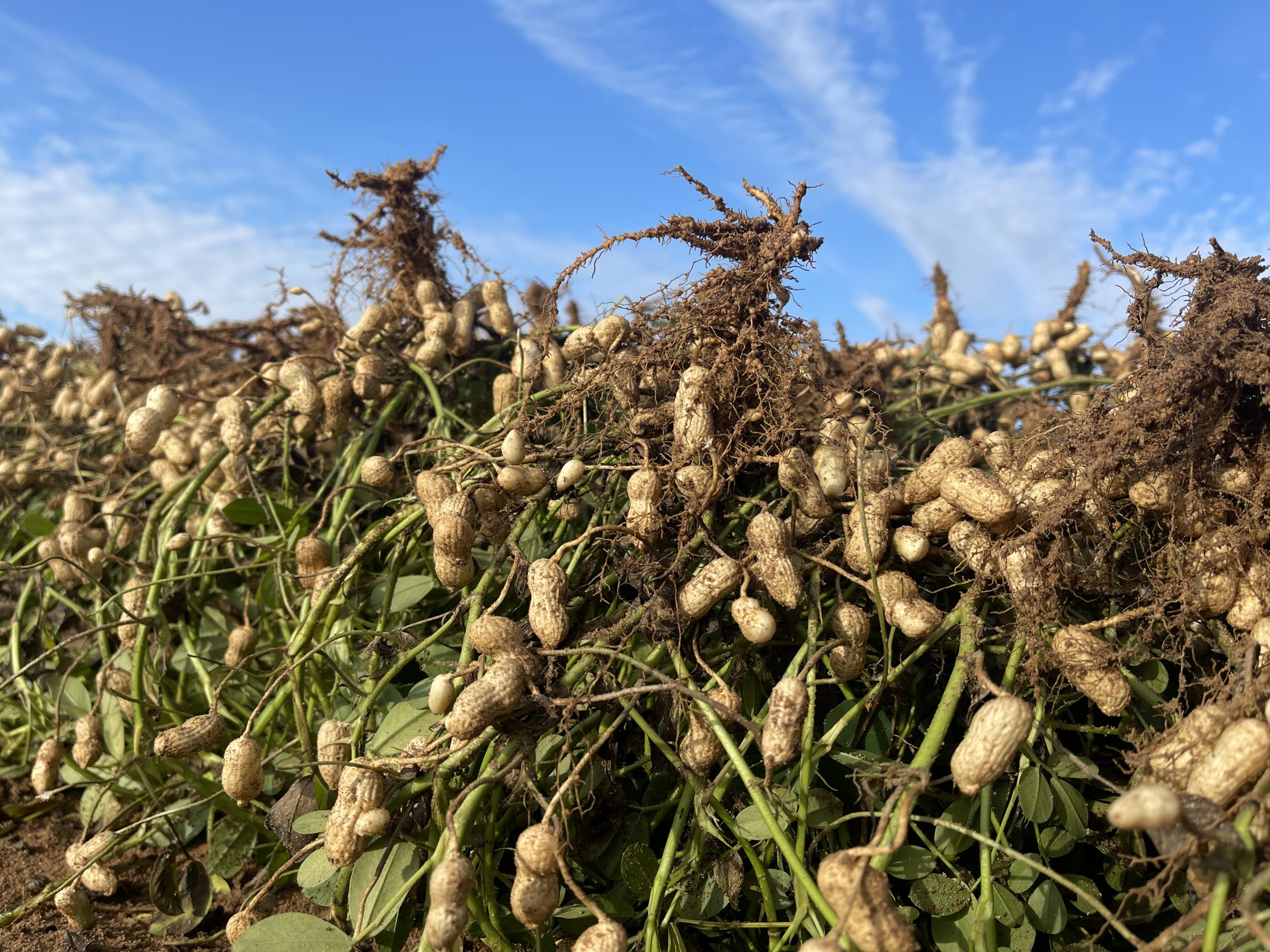
 We are delighted to welcome you to the 2024 Georgia Peanut Tour and thank you for your participation. Whether you’re joining us for the first time or you’re a seasoned “Peanut Tour Veteran,” we are thrilled to have you on our 36th tour. As in previous years, you’ll gain an in-depth look at the production of one of Georgia’s key agricultural crops. We hope this experience will provide you with a deeper understanding of both the challenges faced by our farmers and the reasons we proudly declare that Georgia grows the best peanuts in the world. Our goal is for you to develop a greater appreciation for the rich heritage of peanut farming in our state. Those involved in the peanut industry—farmers, buyers, processors, researchers, Extension personnel, and Georgia Peanut Commission representatives—take great pride in Georgia’s position as the leading peanut-producing state in the U.S., and we’re excited to showcase this year’s crop to you.
We are delighted to welcome you to the 2024 Georgia Peanut Tour and thank you for your participation. Whether you’re joining us for the first time or you’re a seasoned “Peanut Tour Veteran,” we are thrilled to have you on our 36th tour. As in previous years, you’ll gain an in-depth look at the production of one of Georgia’s key agricultural crops. We hope this experience will provide you with a deeper understanding of both the challenges faced by our farmers and the reasons we proudly declare that Georgia grows the best peanuts in the world. Our goal is for you to develop a greater appreciation for the rich heritage of peanut farming in our state. Those involved in the peanut industry—farmers, buyers, processors, researchers, Extension personnel, and Georgia Peanut Commission representatives—take great pride in Georgia’s position as the leading peanut-producing state in the U.S., and we’re excited to showcase this year’s crop to you. The thirty-sixth annual Georgia Peanut Tour will be held September 17-19, 2024, in Americus, Georgia, and the surrounding area. The tour brings the latest information on peanuts while giving a first-hand view of industry infrastructure from production and handling to processing and utilization. Tour stops will be made in several peanut producing counties in South Georgia.
The thirty-sixth annual Georgia Peanut Tour will be held September 17-19, 2024, in Americus, Georgia, and the surrounding area. The tour brings the latest information on peanuts while giving a first-hand view of industry infrastructure from production and handling to processing and utilization. Tour stops will be made in several peanut producing counties in South Georgia.